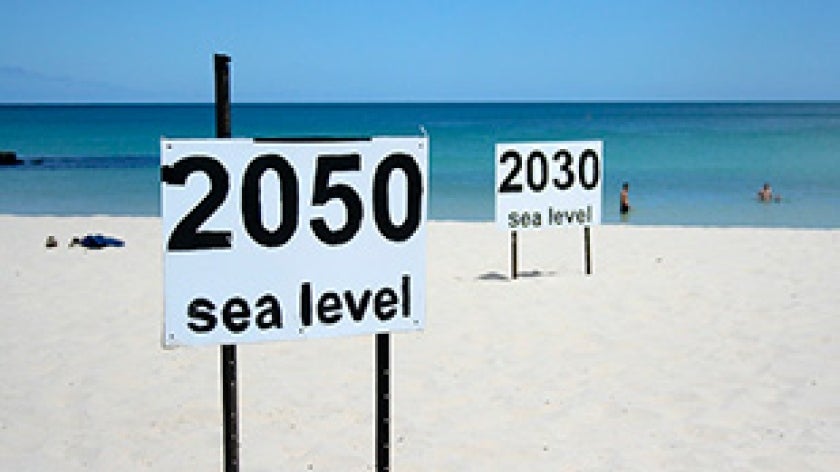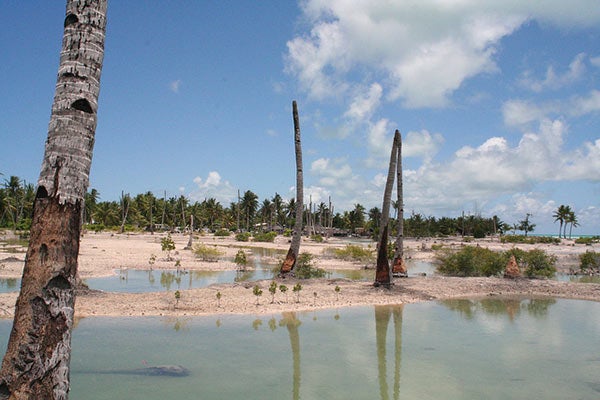
The GEF joins legislators to combat climate change and one of its most devastating effects: rising sea levels.
June 10, 2014 - The GEF joins legislators to combat climate change and one of its most devastating effects: rising sea levels.
"Raise your voice, not the sea level." This was the slogan on World Environment Day, when millions of people all over the world engage in activities to protect the planet and become agents of change.
Similarly, World Oceans Day, with its motto of "Together we have the power to protect the ocean" reminded us this weekend that the oceans offer us finite resources seas and overfishing and pollution are causing irreparable damage to marine ecosystems across the world.
Also this weekend, the Global Environment Facility (GEF) added its voice to those of 80 legislators from around the world, who gathered at the Globe International forum in Mexico. There they signed an unprecedented resolution which commits to review and strengthen national climate laws and to lay the foundations for a global agreement in 2015.
What many of us take for granted is under serious threat: global warming is having a severe impact on the environment and its long-term effects are as unpredictable as they are disturbing. Although many of us believe we have no reason to worry today about something that might happen in 80 years, there are clear signs that this is not the case.
These include rising sea levels, melting glaciers in the Andes and the Himalayas – the main freshwater reserves for millions of people –, unusual droughts and extreme atmospheric conditions, such as maximum-force hurricanes and torrential rains in sub-tropical regions of Argentina or Australia, to name just a few.
"We need to act speedily, because what we are seeing more and more is that the effects of climate change are becoming more serious. Taking action today means we can avoid more costly losses in the future. It also means that we need to use effectively the adaptation options currently at our disposal, as they may not be available tomorrow" underlines Saliha Dobardzic, GEF Senior Climate Change Specialist.
While it is estimated that coastal waters have risen 30 centimeters over the past 200 years, this figure may reach between one-half meter and one meter by the end of this century. Given that one of every two people is expected to live within 100 kilometers of a coastline by the turn of the century, a catastrophe may be just waiting to happen.
That is why this year's campaign supports coastal areas and underscores the urgent need to protect islands from growing risks and challenges in the face of climate change. The Estado Islands of the Kiribati Archipelago in the Pacific Ocean are a clear example. Scientists predict that by the end of this century, most of the 33 islands will be swallowed up by the sea.The GEF, through its Kiribati KAP II and now its KAP III program, has worked to systematically assess problems associated with climate change and to design economically viable adaptation measures.

The program seeks to improve the capacity of the Kiribati government to plan and adapt measures associated with climate and the harmful impact of global warming and rising sea levels. Moreover, it has supported adaptation measures for the protection of the coastline and the sustainable supply of fresh water. The Phoenix Islands in the Kiribati Archipelago are home to the largest marine reserve in the world, with their 410,500 kilometers of atolls, coral reefs, surface and deep waters.
A committed GEF
At the Fifth Session of the GEF, held in Cancun, Mexico last week, participating countries launched the new GEF2020 strategy and approved a US$ 230 million work program that together with previous investments made during 2010-2014 will total US$ 3.7 billion directed towards the protection of the global environment. "The GEF has been strengthening its work in many ways. Perhaps most importantly, we can point to a continued strong engagement in countries to address global environmental challenges of concern to us all," said Naoko Ishii, CEO and Chairperson of the GEF.
In this role, Ishii participated in the Globe World Summit of Legislators against climate change, and ratified the GEF's commitment to continue working with this platform and other members to ensure legislators have the necessary tools and information to make decisions which favor sustainable development. "We need a global coalition in order to make sufficient progress. Lawmakers from around the world can play a key part in helping create the necessary momentum for the new multilateral commitments and agreements," assured Ishii in her speech to delegates who met in the Mexican Congress.
Countries have adopted laws to reduce greenhouse gas emissions, use energy more efficiently, promote renewable energy sources and fight deforestation, among other initiatives. While over 66 countries have such laws on the books, in many cases they have yet to be applied.
Home Page Photo by Julie G. (go_greener_oz)